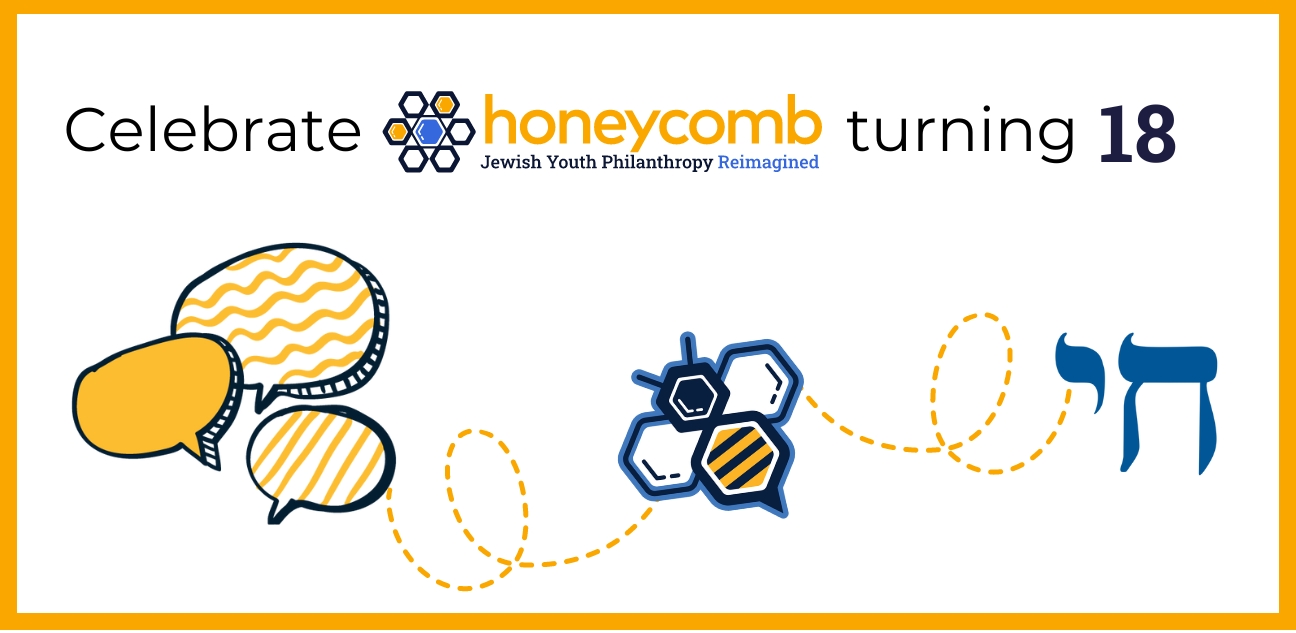For 18 amazing years, Honeycomb has been the leading resource for the field of Jewish Youth Philanthropy. Through training, curriculum, professional development, research, and network-building, Honeycomb (formerly the Jewish Teen Funders Network) is proud to be at the forefront of this amazing field. Without our network of dedicated facilitators and cohorts of initiatives, we would not be able to reach so far and wide. The creation of resources and curriculum would not be possible without our amazing funders, supporters, and our advisory board members. Over the years we have had many talented professionals be part of the Honeycomb team; their ideas, passion, and personalities have pushed Honeycomb for the last 18 years. Follow this celebration series of new interviews and articles for the next 10 weeks as we explore Honeycomb’s lasting impact and our hopes for the future.
Week 7- Margo Pernick, Executive Director at The Jewish Fund.

What has your involvement with Honeycomb been over the years?
The Jewish Fund partnered with Honeycomb in its first cohort when both Honeycomb and The Fund launched teen philanthropy initiatives. We continued this partnership for 5 years and then transitioned to an informal relationship, during which, our Teen Board staff continued networking with other staff in the Honeycomb network. It was very exciting to hold a regional gathering of three teen boards one year. I think this could be a role for Honeycomb in the future to assist in replicating this process.
What comes to mind when you think about Honeycomb?
Honeycomb has been a dynamic convener for Jewish youth philanthropy, bringing professionals together to learn from each other and provide seed funding to launch many of these initiatives. Honeycomb’s use of evaluations to review the year’s experience and plan for the future set the tone for us and we continue to utilize an annual review at the end of the program year.
What was missing in the philanthropic landscape, and how did Honeycomb fit that gap?
Once again, I think the convening aspect is the most significant. There were Jewish teen boards prior to Honeycomb, but I believe each was somewhat of a stand-alone program, not benefitting from a range of voices and experiences. Being able to come together with other professionals, discuss best practices, and network continues to be a huge part of the growth of programs like The Fund.
What does the future of Jewish philanthropy look like, and how do you think Honeycomb can be at the forefront of that?
I hope the future of Jewish teen philanthropy includes an ability to engage alumni and young adults in similar work. Planting seeds in teens is incredible but we need to be able to nurture these seeds into the future. Offering support to create similar types of programs for somewhat older Jewish individuals would provide an opportunity to ensure long-term impact. I think it would be very meaningful for Honeycomb to plan inter-cultural/ethnic group convenings, as well. This will benefit the broader community’s understanding of the Jewish people and ours of other cultures/ groups.
Why do you personally love Honeycomb? What is your affinity for the work we do?
Honeycomb has been very supportive and engaging with us over the years, well beyond our formal relationship, which is great!
Week 6- Rachel Halevi, Program Director of the Jewish Teen Foundation in San Fransisco, California.

What has your involvement with Honeycomb been over the years?
Over the last five years since I started in this role, it has been great to have Honeycomb as a support system. Within months of starting my role, I joined the Facilitator Training and saw the vast array of Jewish teen philanthropic programs across the country and beyond. It was great to learn from one another and Honeycomb programming always feels engaging and full of warmth. Our program serves the Bay Area, but every year we get inquiries from across the country, so it is great to be able to refer them to Honeycomb and know they will help them find the right program. Our Jewish Teen Foundation (JTF) was the first program that started in 2004, so our programming is quite robust, but I appreciate Honeycomb’s supportive network which enables us all to keep abreast of the field in general and have support if needed. Honeycomb was especially helpful during the pandemic, when all of our programming was forced to move virtual at a moment’s notice. We had to pivot quickly, and Honeycomb was there to not only support us but to develop tools to ensure virtual programming was just as engaging. We still use the virtual classroom they taught us about, as an online one-stop shop for all the links and resources our teens will need throughout the year.
What comes to mind when you think about Honeycomb?
I think of the supportive network which has been consistent with Honeycomb. Every program is different, which enables us to learn from one another and push the field forward together.
What was missing in the philanthropic landscape, and how did Honeycomb fit that gap?
While it was before my time, I can imagine that Jewish Youth Philanthropy was isolated into silos and Jewish teen philanthropy professionals did not have the support they needed or deserved. Honeycomb is not only able to provide networking, support, and resources, but I appreciate the studies conducting which help to illustrate the importance of this work, our impact, and how many Jewish philanthropic organizations can and should integrate teen philanthropy into the foundation of what they do.
What does the future of Jewish philanthropy look like, and how do you think Honeycomb can be at the forefront of that?
The future of JYP is creating experiences which build the character of the participant and equip them with the skills to create tangible change within their community. It is no longer enough to have the skills to fundraise and distribute wealth, but to be able to do so intentionally, thoughtfully, and effectively is the goal. Honeycomb can help organizations see this value and help to create this pipeline of empathic, passionate, proud, and strategic leaders.
Why do you personally love Honeycomb? What is your affinity for the work we do?
I appreciate the quality and thoughtful resources that Honeycomb develops. I look forward to continuing to learn from the Honeycomb team and continue to share the resources we have developed as well, as we are all stronger when working together.
Week 5- Check out the recent article and infographic: Toward an Israeli Culture of Teen Philanthropy, which shows how the Honeycomb Foundation Board Incubator programs in Israel are changing their communities, one participant at a time.
Week 4- Alison Berg, Alumna of Teen Programs for the JFCS of Greater Mercer County, New Jersey.

What has your involvement with Honeycomb been over the years?
I started participating in my local youth philanthropy program in 9th grade and was part of the second graduating class. As a newer program in the area, I also served on the first Youth Advisory Board, helping provide feedback and guide the program in its early years so that students could have the best experience. In college, I received the Distinguished Alumni Award for bringing my values to campus as Director of Philanthropy for my sorority. As a participant on Birthright, my group just happened to visit a project that my cohort in the youth philanthropy program helped fund. It was a playground in Sderot that doubled as a bomb shelter to give children the opportunity to play outdoors while creating a safety plan for the frequent bombs. As we toured Sderot, scanning the city for the nearest bomb shelter, just in case the alarm sounded giving us 15 minutes to find safety, this brought to life the real impact of our work and how we give families peace of mind, when there’s not always peace. I was asked to speak with the parents of participants to share this experience.
Now, I serve on the board of an education nonprofit that provides Holocaust education experiences in schools. For the last two years, I’ve successfully submitted RFPs to the same youth philanthropy program I participated in, pitching the education program and receiving funding to continue our work.
What comes to mind when you think about Honeycomb?
I think about empowering young people to make important and impactful financial decisions. First by educating on the Jewish values of Tzedakkah and Tikkun Olam. It gives teenagers a rare opportunity to inquire and be heard by executives at these nonprofits, and then negotiate with their peers. It also allows students to better understand the value of the dollar as they advocate amongst their cohort for the causes they feel most passionate about.
What was missing in the philanthropic landscape, and how did Honeycomb fit that gap?
One thing that is missing from the philanthropic landscape is an understanding of how everyone can meaningfully contribute. Philanthropy is not just for wealthy people. This program shows that even in small denominations that teens can afford, the collective will of a community can have an outsized impact.
Why do you personally love Honeycomb? What is your affinity for the work we do?
I love Honeycomb because it plants the seed of philanthropic giving early to set up teens for a lifetime of informed and meaningful generosity. It is not being influenced to give by seeing a post on social media, but understanding the breadth and depth of need in our communities, from local to global, Jewish to humanitarian. It provides the frameworks to analyze an organization’s programs to best allocate funds. Giving is a muscle, and if you start flexing these muscles young, they remain strong for life.
Week 3-Celeste Albert, Coordinator of Teen Programs for the JFCS of Greater Mercer County, New Jersey.

What has your involvement with Honeycomb been over the years?
Honeycomb is pivotal in networking with and getting resources from other Jewish professionals and it is so amazing to see how the resources and network have grown and become the provider of programs for any type of philanthropic experience.
What comes to mind when you think about Honeycomb?
I have always said if Honeycomb had a Zoom event for how to pick the best markers for teen philanthropy programs, I would be signed up! I trust all the materials and guidance Honeycomb produces. I know and trust that their experiences will be worthwhile not just for the youth, but the Jewish leaders. Lately, I have been very excited about the Holiday Enhancement Guides. It is a great entry point for all ages.
What was missing in the philanthropic landscape, and how did Honeycomb fit that gap?
The year before I became the coordinator of the youth programs, I gained a lot of experience in student development in the college realm, but I wanted to be involved in giving Jewish experiences to HS students for them to bring with them to college. At first, I was drawn to the peer leadership training, but when the philanthropy experience came to be, it was life-changing. We do not speak about philanthropy enough. When philanthropy is taught to younger children, it continues throughout their lives, even way after graduation. It gives them the basis to be leaders in their community and their professional lives.
What is your affinity for the work we do?
I feel that I can’t not be involved with these programs. The positive impact on the participants is too great to pass up. Each year a new class gets the first taste of philanthropy, and they figure out how to be givers, how to ask difficult questions, and most importantly they are learning how to be positive members of their community, but not just for now, forever.
What does the future of Jewish philanthropy look like, and how do you think Honeycomb can be at the forefront of that?
It is an interesting time for the Jewish community post-10/7. We started the year with 5 questions about how the students were feeling about the rise in anti-semitism and how they felt as Jews as the year went on through discussions and their peer-led experiences, we are hoping to look at this time and realize that they are part of something bigger and that they are making a larger impact in the Jewish world. Not just to our local Jewish community, but to the larger Jewish community and culture.
Week 2-Lisa Farber Miller, Principal and Founder, Philanthropy Partners Consulting; Honeycomb Advisory Board

What has your involvement with Honeycomb been over the years?
I had the good fortune to be involved since its inception in 2006 when Honeycomb was known Jewish Teen Funders Network (JTFN). In 1999, I was one of a group of Jewish Funders Network members with Jewish teen philanthropy programs who started imagining a field of Jewish youth philanthropy and proliferating its impact. We began to lay the groundwork through the convenings of practitioners. Seven years later, Ricky Shechtel and Barbara Gervis Lubran co-chaired the first JTFN board of which I was a member.
What comes to mind when you think about Honeycomb?
A dream come true! Way back in 1999, we were committed to an aspirational shared goal of a Jewish youth philanthropy field that would broaden and deepen through incentive funding, technical assistance, materials, and gatherings. We hoped to create a philanthropic landscape where youth were viewed as competent, strategic grantmakers and changemakers, alongside adults. Our goal was that Jewish teens would experience the powerful combination of using Jewish values to inform grantmaking and build identity while becoming agents of positive change in their communities. Honeycomb is the central address for Jewish youth philanthropy and achieved all these goals and more on an international scale.
What was missing in the philanthropic landscape, and how did Honeycomb fit that gap?
Before Honeycomb, we lacked a national platform, funding investments, field building blocks, regular convenings, best practices, and other ways to support and grow the Jewish youth philanthropy community. While there were wonderful examples of excellent programs led by my mentors Marjory Kaplan, Gail Littman (z’l), Sue Shwartzman, Ricky, Barbara, and others, we lacked a unifying organization and scaling capital. Since its founding, Honeycomb is the leading resource for the field of Jewish youth philanthropy. Through training, curriculum, professional development, research, and network-building, Honeycomb is at the forefront of the field.
What does the future of Jewish philanthropy look like, and how do you think Honeycomb can be at the forefront of that?
For me, Jewish youth philanthropy is fundamentally the future of Jewish philanthropy and has all the ingredients for a future of strong, strategic grantmakers responding with empathy and intelligence to turbulent times. It provides a welcoming and compelling doorway to Judaism and Jewish people and strengthens connections to Israel, peoplehood, Jewish learning, and spirituality. It empowers people to be active change agents trained to partner with grantees to create a more just world. Youth philanthropy promotes volunteering, leadership development, collaboration, and crossing divides and differences—the essential elements for Jewish philanthropy to thrive in the future. Like all powerful giving groups, the effect of participating in Jewish youth philanthropy is far-reaching well after a teens’ participation.
Why do you personally love Honeycomb? What is your affinity for the work we do?
For over 20 years I was fortunate to be part of the birth of Jewish youth philanthropy and to see its growth into a recognized field led by Honeycomb. With my team at Rose Youth Foundation, I witnessed the profound impact of youth engaging with their communities and being seen as peers and experts. They made me a far better grantmaker, opening my eyes to teens’ needs and perspectives. The magic of combining Jewish values with philanthropy creates powerful Jewish connections and community. Helping Jewish teens do their part to make the world a better place with strategic philanthropy has been one of my greatest joys.
Week 1-Andres Spokoiny, CEO, Jewish Funders Network; Honeycomb Advisory Board
What has your involvement with Honeycomb been over the years?
As head of JFN, I was involved with Honeycomb since it was called Jewish Teens funders Network. I saw its growth and its development over the years and I’m very proud and excited to celebrate Honeycomb חי!
What comes to mind when you think about Honeycomb?
The major keywords that come to mind are Education, Philanthropy, Leadership, Continuity, Creativity, Youth, and Energy, but these are just words. Without the action and experiences these words are empty. What Honeycomb continues to do is make meaning for these words.
What was missing in the philanthropic landscape, and how did Honeycomb fit that gap?
The community at large is very concerned about developing philanthropy in the next generations. As generational transfers of wealth operate, there’s a risk that new generations don’t have the same philanthropic attitudes (or skills) as their predecessors. Honeycomb is doing precisely that: educating youth to do philanthropy in a smart, strategic, committed, and compassionate way. It succeeded where others failed thanks to a combination of excellent programming, networking, and communications.
What does the future of Jewish philanthropy look like, and how do you think Honeycomb can be at the forefront of that?
The future of philanthropy holds both challenges and opportunities. Honeycomb can help youngsters find the right balance and communicate the importance of “helping your own”. It can use Jewish values to inform emerging challenges in philanthropy. Also, there’s a dearth of leadership (not only in philanthropy but in the world) and Honeycomb is, among other things, a workshop of leadership. Finally, as philanthropy gets more sophisticated and professionalized, Honeycomb gives people the tools and skills to do philanthropy in an effective and meaningful manner.
Why do you personally love Honeycomb? What is your affinity for the work we do?
Personally, I’m a product of Jewish philanthropy. I’m what I am in life because philanthropy helped me get her, so for me philanthropy is deeply personal, it’s my life’s work and a way of giving back. I also believe that philanthropy is and will be key to addressing the many issues we face as a people and a world.
As JFN’s CEO, I always say that Honeycomb is our hidden Jewel, for it builds the future of philanthropy like nobody else.
